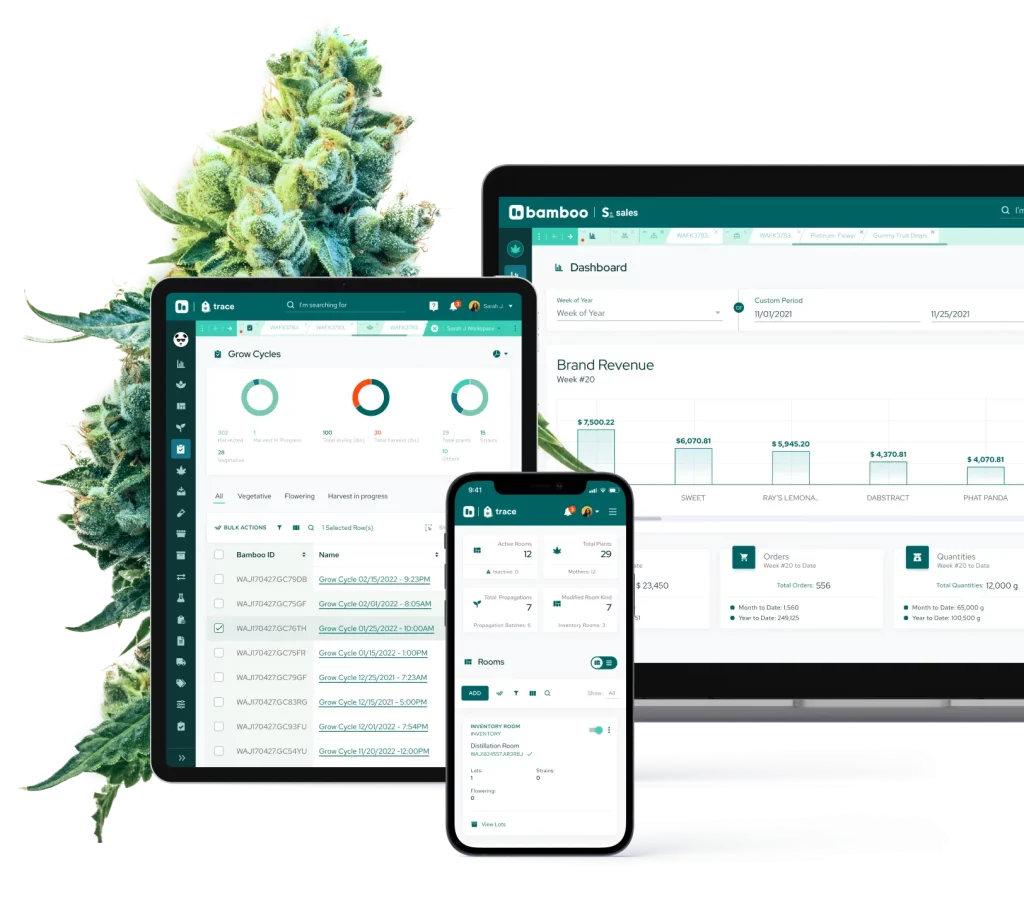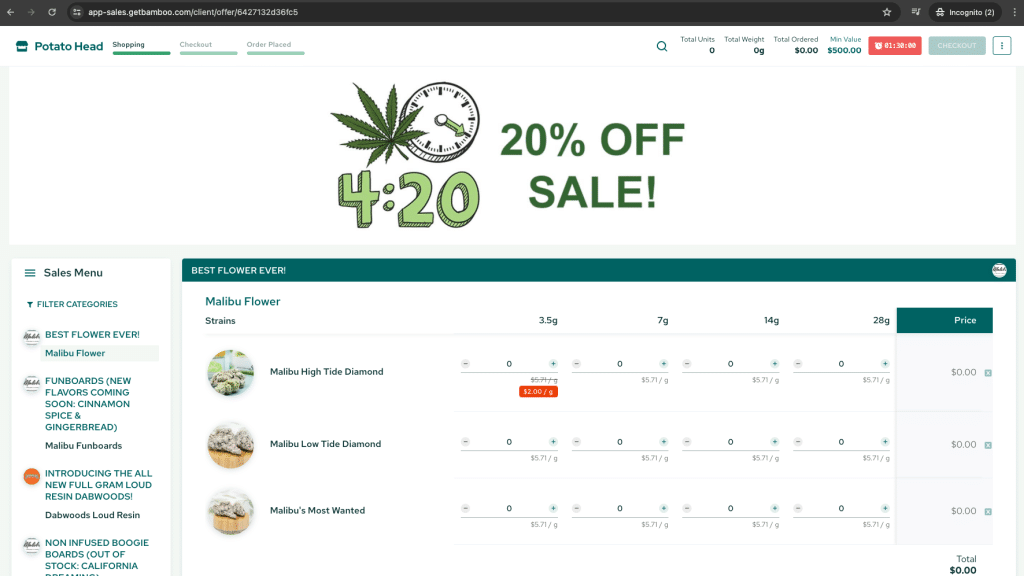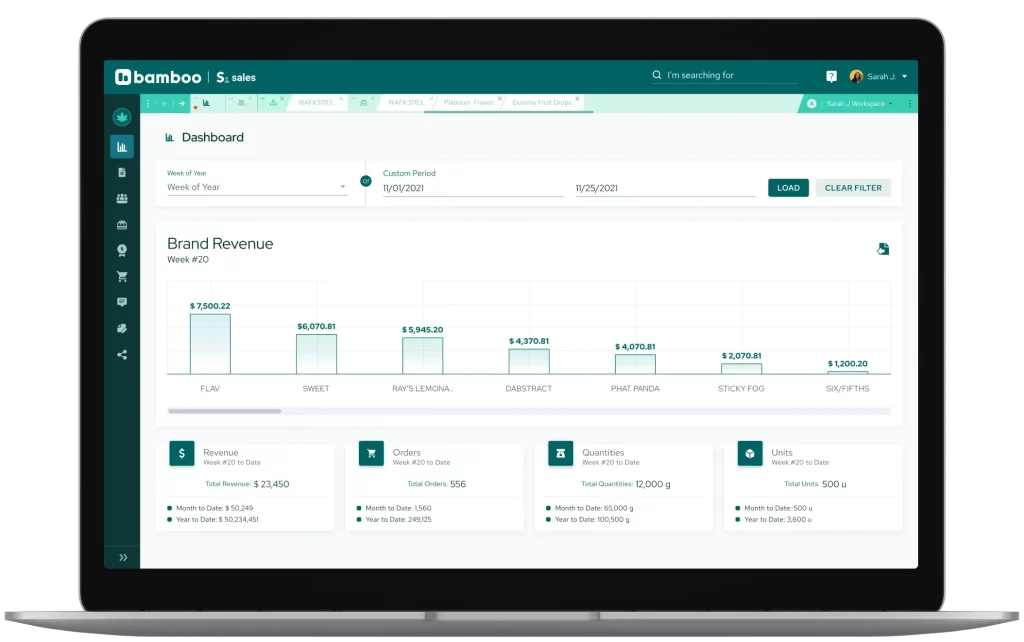Colorado Seed to Sale Cannabis Software
The Bamboo platform offers tailored software solutions designed specifically for the Colorado’s cannabis industry, helping businesses in streamlining operations, enhancing traceability, and fine-tuning sales approaches.
Through Bamboo Sales and Trace, Colorado cannabis enterprises efficiently handle inventory, maintain compliance with state regulations, and unlock revenue opportunities. With functionalities such as live inventory monitoring, customizable sales interfaces, and integrated compliance tools, Bamboo equips cannabis businesses to thrive and expand within Colorado’s dynamic cannabis landscape.

Colorado's Recreational Market
Colorado’s recreational cannabis market, one of the most established in the United States, has continued to demonstrate stability and maturation. Here’s an overview of some key developments:
- Sales and revenue:
- According to the Colorado Department of Revenue, total adult-use cannabis sales for the 2023 calendar year reached approximately $2.2 billion, a 5% increase from the previous year.
- The state collected around $400 million in cannabis tax revenue, which is allocated to various programs, including education, public health, and law enforcement.
- Market trends:
- The market saw a continued emphasis on sustainable and environmentally friendly cultivation practices, with many growers adopting organic and regenerative techniques.
- Infused beverages and edibles experienced significant growth, with new product formulations and partnerships driving innovation and consumer interest.
- Concentrates and vape products remained popular, with a focus on high-potency and flavorful extracts.
- Regulatory changes:
- In mid-2023, Colorado implemented new regulations aimed at enhancing product safety and labeling, including more stringent testing requirements for contaminants and clearer dosage information for edibles.
- The state also updated its delivery regulations, allowing for a wider range of products to be delivered directly to consumers.
- Industry developments:
- Several prominent Colorado-based cannabis companies expanded into other states, leveraging their brand recognition and operational expertise.
- The market saw increased investment in research and development, with companies exploring new product formulations and cannabinoid profiles.
- Cannabis tourism continued to be a significant driver of the Colorado market, with a growing number of hotels, tours, and experiences catering to cannabis consumers.
- Social equity:
- Colorado continued to implement its social equity program, which provides licenses, funding, and support for individuals from communities disproportionately impacted by cannabis prohibition.
- The state also launched a new grant program to support cannabis-related expungement and reentry services.
- Challenges:
- While Colorado’s market is relatively mature, the state still faced issues related to oversupply and price compression, particularly in the wholesale flower market.
- The ongoing federal prohibition of cannabis created challenges related to banking, taxes, and interstate commerce.
Overall, Colorado’s recreational cannabis market demonstrated continued stability and innovation, with steady sales growth, new product trends, and a focus on sustainability and social equity. As one of the first states to legalize adult-use cannabis, Colorado remains a leader in the industry, setting standards for regulation, product quality, and consumer experience. However, challenges related to oversupply, federal prohibition, and market saturation will require ongoing attention and adaptation from regulators and industry stakeholders.
Colorado's Road to Recreational Cannabis
Colorado’s journey to legalizing recreational cannabis was a pioneering effort that paved the way for other U.S. states to follow. Here’s a timeline of the key events:
- 2000: Colorado voters approved Amendment 20, legalizing medical cannabis for patients with certain qualifying conditions.
- 2001-2009: The state developed and implemented regulations for its medical cannabis program, including a patient registry and caregiver system.
- 2006-2007: Denver became one of the first major U.S. cities to remove criminal penalties for adult cannabis possession, signaling a shift in public opinion.
- 2010: Efforts to legalize recreational cannabis through a ballot initiative (Proposition 19) were unsuccessful, but the campaign laid the groundwork for future legalization efforts.
- 2011: A group of advocates and organizations formed the Campaign to Regulate Marijuana Like Alcohol, aiming to place a recreational cannabis legalization initiative on the 2012 ballot.
- November 2012: Colorado voters approved Amendment 64 with 55.3% of the vote, legalizing the possession, consumption, and cultivation of cannabis for adults 21 and older.
- December 2012: Provisions of Amendment 64 allowing adults 21 and older to possess up to one ounce of cannabis and to cultivate up to six plants at home took effect.
- 2013:
- The Colorado General Assembly passed several bills to establish a regulatory framework for the adult-use cannabis industry, including licensing requirements, taxation, and product safety standards.
- The Colorado Department of Revenue, tasked with regulating the industry, began developing rules and procedures for licensing cannabis businesses.
- January 2014: The first licensed recreational cannabis retail stores opened in Colorado, marking the beginning of legal adult-use sales.
- 2014-2023:
- Colorado’s adult-use cannabis market has continued to grow and evolve, with the state regularly adapting its regulations to address emerging challenges and opportunities.
- The state has implemented various measures to promote public health and safety, such as packaging and labeling requirements, product potency limits, and youth prevention campaigns.
- Cannabis tax revenue has been allocated to education, public health, and law enforcement initiatives.
Colorado’s successful legalization of recreational cannabis has had a significant impact on the national conversation surrounding cannabis policy reform. The state’s experience has demonstrated the potential for a well-regulated adult-use industry to generate tax revenue, create jobs, and reduce the burden on the criminal justice system, while also highlighting the importance of ongoing efforts to promote public health and safety. As other states continue to legalize cannabis, Colorado’s pioneering efforts serve as a valuable reference point for best practices and lessons learned.
Traceability, Compliance & Regulation in Colorado
Colorado selected Metrc as its seed-to-sale tracking system for cannabis in 2013. The decision was primarily driven by the need for a comprehensive regulatory framework to oversee the burgeoning recreational cannabis industry.
Metrc was chosen for its proven track record in providing seed-to-sale tracking solutions for regulated cannabis markets. It offered robust features such as real-time inventory tracking, batch tracking, and comprehensive reporting capabilities, which were essential for ensuring compliance with state regulations and preventing diversion of cannabis into the illicit market (black market).
In Colorado, recreational cannabis is subject to strict traceability, compliance, and regulation requirements. The state has established a comprehensive framework to ensure the legal and responsible operation of the cannabis industry. Here are the key aspects of recreational cannabis traceability, compliance, and regulation in Colorado:
- Seed-to-Sale Tracking:
- Colorado uses the Marijuana Enforcement Tracking Reporting Compliance (METRC) system for seed-to-sale tracking of cannabis plants and products.
- All licensed cannabis businesses, including cultivators, manufacturers, and retailers, must use METRC to track the movement of cannabis from seed to final sale.
- Each plant is assigned a unique identifier tag, and all products derived from that plant are tracked throughout the supply chain.
- Licensing and Permits:
- The Colorado Marijuana Enforcement Division (MED) is responsible for issuing licenses and permits to cannabis businesses.
- Businesses must obtain the appropriate licenses for their operations, such as cultivation, manufacturing, or retail sales.
- License holders are subject to background checks, financial disclosures, and other requirements to ensure their suitability for operating in the industry.
- Inventory Tracking and Reporting:
- Licensed cannabis businesses must maintain accurate inventory records and report their inventory to the MED through METRC.
- This includes tracking the quantity of cannabis plants, harvested materials, and finished products at each stage of the supply chain.
- Businesses must also report any discrepancies, losses, or diversions of inventory to the MED.
- Testing and Labeling:
- All cannabis products must undergo mandatory testing at licensed testing facilities before they can be sold to consumers.
- Testing includes analysis for potency, contaminants, and other quality control measures.
- Products must be labeled with accurate information about their contents, potency, and any required warnings or disclosures.
- Security and Surveillance:
- Cannabis businesses must implement strict security measures, including video surveillance, access control, and inventory storage requirements.
- These measures help prevent theft, diversion, and unauthorized access to cannabis products.
- Packaging and Advertising Restrictions:
- Colorado has specific requirements for the packaging and labeling of cannabis products to ensure they are not attractive to children and do not make false or misleading claims.
- Advertising and marketing of cannabis products are also regulated to prevent targeting underage individuals and to promote responsible consumption.
- Inspections and Enforcement:
- The MED conducts regular inspections of licensed cannabis businesses to ensure compliance with all applicable laws and regulations.
- Violations can result in fines, license suspensions, or revocations, depending on the severity and frequency of the infraction.
- Taxation and Revenue Tracking:
- Colorado imposes taxes on the sale of recreational cannabis, including an excise tax and a sales tax.
- Businesses must accurately track and report their sales and tax liabilities to the Colorado Department of Revenue.
These regulations aim to ensure the safety, quality, and accountability of the recreational cannabis industry in Colorado while preventing diversion to the illicit market and protecting public health and safety. Businesses operating in the cannabis industry must stay informed about any changes or updates to these regulations to maintain compliance.
Why Bamboo for Colorado?
Are you ready to stand out among the sea of Leaflink, Distru and other marketplace users?
Say hello to Bamboo, your all-in-one solution. With seamless integration with Metrc, Bamboo offers a hassle-free two-way sync, making traceability and product labeling a breeze. What’s even better? Bamboo Trace comes at no extra cost for all Colorado Metrc users, ensuring smooth and effortless traceability alongside integrated Bamboo Sales.
Now, more and more businesses are jumping on board Bamboo’s proactive sales strategies. Picture this: user-friendly menus for quick ordering on any device. Plus, our sales menu website integration is a cinch to set up and can even boost your revenue. And let’s not forget about Bamboo’s nifty feature that lets you create as many proposal orders as you need. Talk about making life easier for your buyers! With Bamboo Sales, you’ll also get access to powerful data analytics with customizable reporting and much more!
Ready to revolutionize your operations? It’s time to make the switch to Bamboo.
Bamboo Trace
✔ Quick-action buttons available in every module for swift navigation and action execution.
✔ Simplified traceability through real-time two-way synchronization with Colorado’s seed-to-sale system (Metrc).
✔ Receive instant notifications for important updates and events.
✔ Work in offline mode, accessible on both mobile and desktop devices, especially useful during periods of downtime in Metrc API systems.
✔ Ability to support multiple licenses for comprehensive management of operations.
✔ Customize label templates to meet Colorado’s Metrc regulations and efficiently generate multiple labels for various plant and product requirements.
✔ Comprehensive management of Strains, Rooms, Propagations, Grow Cycles, Plants, Harvests, Disposals, Inventories, Conversions, QA Samples, and more, all integrated within Bamboo Trace.
✔ Effortlessly process orders and generate manifests in just minutes for enhanced efficiency.

Bamboo Sales
✔ Utilize the finest Sales Menus available in Cannatech for enhanced sales strategies.
✔ Seamlessly integrate Sales Menus with your website for expanded reach and accessibility.
✔ Simplify email marketing efforts with the built-in feature tailored for sending sales menus effortlessly.
✔ Gain insights through comprehensive sales analytics and reporting on clients, sales reps, and customizable metrics.
✔ Generate numerous recommended orders (proposals) to cater to diverse client needs.
✔ Customize Real-time Sales Menus according to preferences and branding.
✔ Easily manage discounts, credits, pricing tiers, and distribution lists for streamlined operations.
✔ Efficiently handle all your sales enablement strategies within the Bamboo Sales platform.

